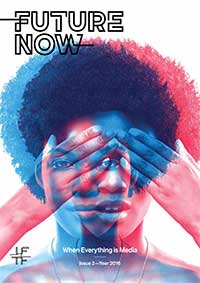Future Now
The IFTF Blog
The Listening City
Amidst the din, noise, and clamor of the city, people are still being heard. Here are their stories
It’s 2026. Listening has multiplied and flourished. And who is doing most of the listening? Machines, thanks to advances in natural language comprehension and communication, the sophistication of emotive, intuitive, and responsive AI, and the seamlessness of human-machine communication.
Proponents of machine listening welcome these new outlets for reflection, feedback, confessing, compassion, sympathy, advice, and intimacy. Others argue that human emotion, empathy, judgment, and love are irreplaceable. We interviewed six people from the listening city to help understand what we get from listening and being listened to, and if it matters who, or what, is doing the listening.
Desha, age 16
 I needed some extra money, so I agreed to wear a Bug for six weeks. Basically, it’s a multi-media rig (camera, microphone, sensor, and transmitter) encapsulated in this nose ring. I wear it, and it records my conversations, my interactions, my activities, what I look at, what I pay attention to, and how I feel. I know that LoveBugs, the company that pays me and collects the data, wants to know what 16-year-olds like me talk about and think about. I don’t know who they sell that data to, though. Whatever. After the first couple days, I forgot about it, and I just lived my life. The best part? I made a whole bunch of money just by letting someone listen to me!
I needed some extra money, so I agreed to wear a Bug for six weeks. Basically, it’s a multi-media rig (camera, microphone, sensor, and transmitter) encapsulated in this nose ring. I wear it, and it records my conversations, my interactions, my activities, what I look at, what I pay attention to, and how I feel. I know that LoveBugs, the company that pays me and collects the data, wants to know what 16-year-olds like me talk about and think about. I don’t know who they sell that data to, though. Whatever. After the first couple days, I forgot about it, and I just lived my life. The best part? I made a whole bunch of money just by letting someone listen to me!
Martín, age 36
 I’ve struggled with depression for most of my life. I’ve tried medication, cognitive behavioral therapy, group therapy, meditation…you name it. I bought one of these Wilsons a couple weeks ago. Wilson—y’know, that old movie with Tom Hanks where he gets marooned on an island and talks to a soccer ball? Yeah, I’ve never seen it either. Anyway, you can talk to it, and if you want it to, it will talk back to you. It’s pretty smart. You can adjust the settings, like “Low Emotive,” which means it just says, “Mmm hmmm… I hear you,” and “Yes, Martín, that sounds difficult.” If you adjust it to “High Emotive,” it reacts more to what you say, offers suggestions and alternatives, and is much more animated. Better than a few of the therapists I’ve had! I still have a human therapist who I see, but sometimes, on weekends or late at night, it’s just nice to have someone to talk to.
I’ve struggled with depression for most of my life. I’ve tried medication, cognitive behavioral therapy, group therapy, meditation…you name it. I bought one of these Wilsons a couple weeks ago. Wilson—y’know, that old movie with Tom Hanks where he gets marooned on an island and talks to a soccer ball? Yeah, I’ve never seen it either. Anyway, you can talk to it, and if you want it to, it will talk back to you. It’s pretty smart. You can adjust the settings, like “Low Emotive,” which means it just says, “Mmm hmmm… I hear you,” and “Yes, Martín, that sounds difficult.” If you adjust it to “High Emotive,” it reacts more to what you say, offers suggestions and alternatives, and is much more animated. Better than a few of the therapists I’ve had! I still have a human therapist who I see, but sometimes, on weekends or late at night, it’s just nice to have someone to talk to.
Suriya, age 62
 I’m worried. And I am angry. The proliferation of these Wilson devices are not helping. People are led to believe that mental health is simply telling someone something and having the therapist say, “Mmm hmmm, mmm hmmm.” It’s not that easy! I am a PhD clinical psychologist. I did practica. I had supervision. I went to school. I go to training and conferences. There is something called therapeutic judgment and clinical expertise! We are trying to get the FDA to intervene. These devices are not marketed as medical devices but they are being used as such. I had a client the other day come in for a session and say, “I am going to cut back my sessions with you to once a month because I have Wilson now!” This is not about job security. This is about responsible mental health service.
I’m worried. And I am angry. The proliferation of these Wilson devices are not helping. People are led to believe that mental health is simply telling someone something and having the therapist say, “Mmm hmmm, mmm hmmm.” It’s not that easy! I am a PhD clinical psychologist. I did practica. I had supervision. I went to school. I go to training and conferences. There is something called therapeutic judgment and clinical expertise! We are trying to get the FDA to intervene. These devices are not marketed as medical devices but they are being used as such. I had a client the other day come in for a session and say, “I am going to cut back my sessions with you to once a month because I have Wilson now!” This is not about job security. This is about responsible mental health service.
Alan, age 26
I am a convicted sex offender. I’ve been convicted of sexual abuse of minors more than once. Even though I served my full sentences, the state was not going to release me from the correctional center because they thought that I was at high risk for reoffending. I was part of a lawsuit to force the state to allow me and other offenders to be released if we agreed to a new monitoring and rehabilitation program.  Essentially, I wear what used to be called an “electronic ankle bracelet.” Before, it would just track movement via GPS. Now, it has sensors to detect galvanic skin response, brain wave activity, heart rate, penile tumescence, and hormonal shifts. Any red flags about my sexual thoughts or behavior trigger an alert. When I am alerted, I need to check in within ten minutes. This means I call into my sponsor, report my whereabouts and what I am doing, and do some de-escalation exercises if necessary. I can also request a counseling session. Sometimes, my counselor is a human being, if I am deemed to be at high risk. Other times, it’s a bot. Believe it or not, a bot helps—if only to remind me to stay on my program. It’s better than going back to jail.
Essentially, I wear what used to be called an “electronic ankle bracelet.” Before, it would just track movement via GPS. Now, it has sensors to detect galvanic skin response, brain wave activity, heart rate, penile tumescence, and hormonal shifts. Any red flags about my sexual thoughts or behavior trigger an alert. When I am alerted, I need to check in within ten minutes. This means I call into my sponsor, report my whereabouts and what I am doing, and do some de-escalation exercises if necessary. I can also request a counseling session. Sometimes, my counselor is a human being, if I am deemed to be at high risk. Other times, it’s a bot. Believe it or not, a bot helps—if only to remind me to stay on my program. It’s better than going back to jail.
Yumi, age 24
There was a guy, Bernie Krause, who did some phenomenal work from the late 1960s into the 2000s on biophony and natural soundscapes. He devoted his entire career to studying the sounds of the natural environment and the ways in which the “natural orchestra” tells us about the health of an ecosystem.  In my opinion, he was a genius. Inspired by him, I started my ecotourism company to get people out of the noise of the city and into the symphony of nature. When people actually get to listen to ecosystems and learn to appreciate the sounds of creature voices on both holistic and intimate levels, they are usually transformed by the experience. What is the sound of millions of ant feet? What does it tell us about collective action? What is the language of birds and what might we learn about our own patterns of communication with each other? We can’t really listen if we aren’t able to hear.
In my opinion, he was a genius. Inspired by him, I started my ecotourism company to get people out of the noise of the city and into the symphony of nature. When people actually get to listen to ecosystems and learn to appreciate the sounds of creature voices on both holistic and intimate levels, they are usually transformed by the experience. What is the sound of millions of ant feet? What does it tell us about collective action? What is the language of birds and what might we learn about our own patterns of communication with each other? We can’t really listen if we aren’t able to hear.
Dafne, age 32
I read an article from 2016 about The Swedish Number, a platform that allows people from all over the world to call Sweden and speak directly to a Swede about Sweden—or anything else. The number was established to encourage interest in Sweden— and potential tourism. I loved the thought of citizens talking directly to citizens, so that’s why I started Vox- Pangea. We scaled The Swedish Number and made it worldwide. Some governments have tried to block us, but we’ve found ways around it. You can select a country, a person with a particular interest, a particular age.  Or you can just say, “I want to speak to a citizen of the world.” It’s secure and encrypted, so people can’t stalk you. Of course, if the conversation heads into a weird or unpleasant conversation, you can always end the call—and leave feedback about the caller. If a person has bad reviews, chances are good that people won’t take their call. The real-time language translation helps to ease language barriers. By intention, we let callers figure out cultural differences and unclear meanings of expression or syntax on their own. Sometimes, people new to the platform will say, “So, what do I get out of calling up a perfect stranger?” We always say, “You get to listen to someone else—and have someone else listen to you.” Ideally, that’s what being a citizen of the world means.
Or you can just say, “I want to speak to a citizen of the world.” It’s secure and encrypted, so people can’t stalk you. Of course, if the conversation heads into a weird or unpleasant conversation, you can always end the call—and leave feedback about the caller. If a person has bad reviews, chances are good that people won’t take their call. The real-time language translation helps to ease language barriers. By intention, we let callers figure out cultural differences and unclear meanings of expression or syntax on their own. Sometimes, people new to the platform will say, “So, what do I get out of calling up a perfect stranger?” We always say, “You get to listen to someone else—and have someone else listen to you.” Ideally, that’s what being a citizen of the world means.
 FUTURE NOW—When Everything is Media
FUTURE NOW—When Everything is Media
In this second volume of Future Now, IFTF's print magazine powered by our Future 50 partnership, we explore the future of communications, tracing historical technology shifts through the present and focusing on the question: “What is beyond social media?”
Think of Future Now as a book of provocations; it reflects the curiosity and diversity of futures thinking across IFTF and our network of collaborators. This issue contains expert interviews, profiles and analyses of what today’s technologies tell us about the next decade, as well as comics and science fiction stories that help us imagine what 2026 (and beyond) might look and feel like.
About IFTF's Future 50
Every successful strategy begins with an insight about the future. Every organization needs to build the capacity to anticipate the future. The Future 50 is a side-by-side relationship with Institute for the Future; it’s a partnership focused on strategic foresight on a ten-year time horizon. With 50 years of futures research in society, technology, health, the economy, and the environment, IFTF has the perspectives, networks, signals, and tools to make sense out of the emerging future.
For More Information
For more information on IFTF's Future 50 Partnership and Tech Futures Lab, contact:
Sean Ness | sness@iftf.org | 650.233.9517



